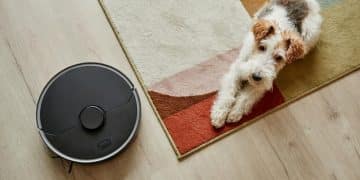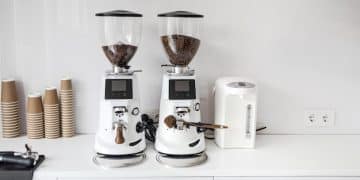Buying Guide: Selecting the Best Vacuum for Hardwood Floors in 2025
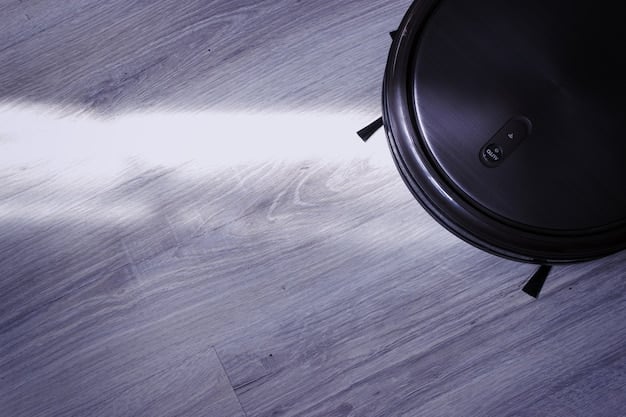
Selecting the right vacuum cleaner for hardwood floors in 2025 involves considering factors such as suction power, brush type, filtration system, and maneuverability to ensure efficient cleaning without damaging the delicate surface.
Choosing the buying guide: selecting the right vacuum cleaner for hardwood floors in 2025 can be a daunting task. With so many options on the market, how do you ensure you’re picking a vacuum that effectively cleans your hardwood floors without scratching or damaging them?
Understanding Your Hardwood Floors
Before diving into the specifics of vacuum cleaners, it’s essential to understand the nature of your hardwood floors. Different types of wood, finishes, and even the age of the flooring can influence the type of vacuum cleaner that would work best.
Hardwood floors are susceptible to scratches, dents, and finish damage. Therefore, a vacuum cleaner designed for these delicate surfaces is crucial. Understanding the nuances of your flooring will guide you towards a vacuum that preserves its beauty and longevity.
Identifying Your Hardwood Type
Different types of hardwood require different levels of care. Softer woods like pine are more prone to scratches than harder woods like oak or maple. Identifying the type of wood you have will help you determine the gentleness needed in a vacuum cleaner.
Assessing the Finish
The finish on your hardwood floors also plays a significant role. Some finishes are more resilient than others. Understanding the durability of your finish will prevent the use of overly abrasive cleaning tools that could cause damage.
- Consider using a vacuum with adjustable suction settings to protect delicate finishes.
- Opt for vacuums with soft brush rolls designed specifically for hardwood floors.
- Regularly inspect your vacuum’s brush roll for any debris that could scratch the floor.
By taking the time to understand the specific needs of your hardwood floors, you can make an informed decision when selecting a vacuum cleaner. This ensures efficient cleaning while safeguarding the integrity of your flooring.
Key Features to Look for in a Hardwood Floor Vacuum
When searching for the ideal vacuum cleaner for your hardwood floors, several key features can make a significant difference in performance and floor protection. Paying attention to these aspects will help you narrow down your options and choose a vacuum that meets your specific needs.
From adjustable suction to specialized brush rolls, the right features ensure effective cleaning without risking damage to your valuable hardwood floors. Knowing what to look for will empower you to make the best choice.
Adjustable Suction Control
Adjustable suction control is vital for hardwood floors. This feature allows you to reduce the vacuum’s power on delicate surfaces, preventing scratches and finish damage. Lower suction is generally sufficient for removing dust and light debris.
Soft Brush Roll
A soft brush roll is specifically designed for hardwood floors. Unlike traditional brush rolls with stiff bristles, soft brush rolls gently sweep away dirt and debris without causing scratches. These are often made of microfiber or felt-like materials.
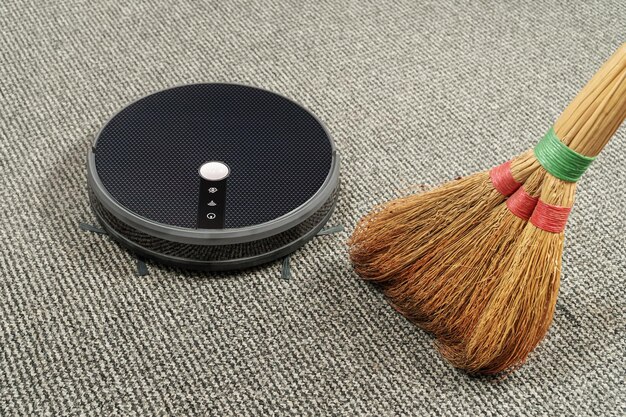
- Check for vacuums labeled as “hardwood floor vacuums,” as they often include soft brush rolls.
- Ensure the brush roll is easy to remove and clean to prevent buildup that could scratch the floor.
- Consider vacuums with brush roll on/off switches for added control.
Prioritizing these features ensures your vacuum cleaner effectively cleans your hardwood floors while protecting their delicate surfaces. Each element contributes to a cleaning process that is both efficient and safe for your investment.
Types of Vacuum Cleaners Suitable for Hardwood Floors
The market offers a variety of vacuum cleaner types, each with its pros and cons for hardwood floors. Knowing the differences between these types will help you determine which one best suits your cleaning needs and floor protection requirements.
From stick vacuums to canister models, the right type of vacuum can enhance your cleaning efficiency and preserve the beauty of your hardwood floors. Understanding these options is key to making an informed decision.
Stick Vacuums
Stick vacuums are lightweight and easy to maneuver, making them ideal for quick cleanups. Many models come with soft brush rolls and adjustable suction settings, making them suitable for hardwood floors. They are often cordless, providing added convenience.
Canister Vacuums
Canister vacuums are known for their powerful suction and versatility. They typically come with a variety of attachments, including soft brush heads designed for hardwood floors. The canister design allows for easy maneuvering around furniture and tight spaces.
Robotic Vacuums
Robotic vacuums offer hands-free cleaning and can be programmed to clean on a schedule. Many models are equipped with sensors to avoid bumping into furniture and soft brush rolls to protect hardwood floors. They are ideal for maintaining cleanliness between deep cleanings.
- Consider a stick vacuum for small apartments or quick daily cleanups.
- Choose a canister vacuum if you need powerful suction and versatile attachments.
- Opt for a robotic vacuum to automate your cleaning routine and maintain consistent cleanliness.
Choosing the right type of vacuum cleaner can significantly impact the efficiency and safety of your hardwood floor cleaning routine. Each type offers unique advantages tailored to different cleaning needs and preferences.
Corded vs. Cordless Vacuums: Which is Best for Hardwood Floors?
When deciding on a vacuum cleaner for hardwood floors, one of the primary considerations is whether to choose a corded or cordless model. Each has its advantages and disadvantages, depending on your cleaning needs and preferences.
Corded vacuums offer consistent power, while cordless models provide greater freedom of movement. Weighing these factors will help you determine which type suits your lifestyle and cleaning requirements best.
Corded Vacuums: Pros and Cons
Corded vacuums provide consistent, uninterrupted power, making them ideal for larger homes and deep cleaning sessions. They don’t rely on battery life, ensuring you can clean for as long as needed. However, the cord can limit maneuverability and require frequent outlet changes.
Cordless Vacuums: Pros and Cons
Cordless vacuums offer unparalleled freedom of movement, allowing you to clean without being tethered to an outlet. They are lightweight and easy to store, making them perfect for quick cleanups and smaller spaces. However, they are limited by battery life and may not provide as much power as corded models.
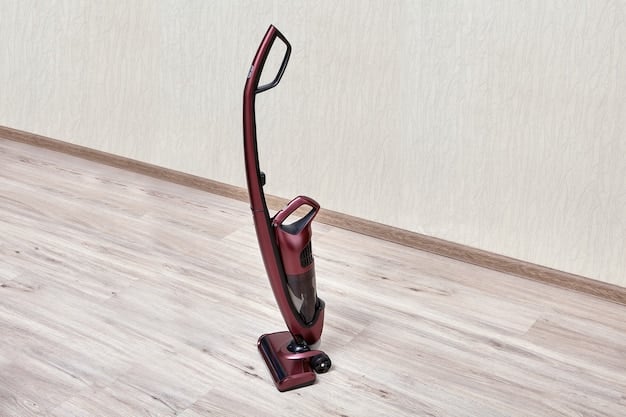
- Opt for a corded vacuum if you need consistent power and have a larger area to clean.
- Choose a cordless vacuum for convenience, portability, and quick cleanups.
- Consider the battery life and charging time of cordless models to ensure they meet your cleaning needs.
The choice between corded and cordless vacuums depends on your individual cleaning habits and the size of your home. Each type offers a unique set of benefits that cater to different lifestyles and preferences.
Maintaining Your Vacuum Cleaner for Optimal Hardwood Floor Care
Proper maintenance of your vacuum cleaner is essential for ensuring its effectiveness and prolonging its lifespan. Regular cleaning and upkeep not only improve performance but also prevent damage to your hardwood floors.
From emptying the dustbin to cleaning the brush roll, simple maintenance tasks can make a significant difference in how well your vacuum cleaner performs. A well-maintained vacuum protects your floors and saves you money in the long run.
Emptying the Dustbin Regularly
A full dustbin can reduce suction power and decrease cleaning efficiency. Emptying the dustbin after each use or when it reaches the fill line ensures optimal performance and prevents clogs.
Cleaning or Replacing Filters
Dirty filters can restrict airflow and reduce suction. Depending on the type of filter, you should either clean it regularly or replace it according to the manufacturer’s instructions. Clean filters improve air quality and maintain suction power.
Inspecting and Cleaning the Brush Roll
The brush roll can accumulate hair, fibers, and other debris that can scratch hardwood floors. Regularly inspect and clean the brush roll to remove any buildup. Some vacuums have removable brush rolls for easy cleaning.
- Set a schedule for regular vacuum maintenance to prevent performance issues.
- Use appropriate cleaning tools and solutions to clean your vacuum effectively.
- Follow the manufacturer’s recommendations for maintenance and replacement parts.
By adopting a consistent maintenance routine, you can keep your vacuum cleaner in top condition and ensure it continues to provide efficient and safe cleaning for your hardwood floors. Regular upkeep is an investment in the longevity of both your vacuum and your flooring.
Top Vacuum Cleaner Brands for Hardwood Floors in 2025
Several brands stand out in the market for producing high-quality vacuum cleaners specifically designed for hardwood floors. These brands incorporate innovative features and technologies to protect delicate surfaces while providing excellent cleaning performance.
Exploring the top brands can help you narrow down your options and find a vacuum cleaner that meets your specific needs and preferences. Each brand offers unique strengths and caters to different cleaning requirements.
Dyson
Dyson is renowned for its powerful suction technology and innovative designs. Many Dyson vacuums feature soft brush rolls and adjustable suction settings, making them suitable for hardwood floors. Their cordless models offer convenient maneuverability.
Shark
Shark offers a range of vacuum cleaners with excellent suction and versatile features. Their models often include DuoClean technology, which combines a soft brush roll with a bristle brush to effectively clean hardwood floors and carpets. They also have lightweight and maneuverable options.
Bissell
Bissell provides a variety of affordable and reliable vacuum cleaners for hardwood floors. Their models often include soft brush rolls and adjustable suction settings. Bissell also offers specialized hardwood floor cleaning solutions for added convenience.
- Research customer reviews and ratings to gauge the performance and reliability of different brands and models.
- Compare features and specifications to determine which vacuum cleaner best meets your cleaning needs.
- Consider your budget and prioritize the features that are most important to you.
Choosing a vacuum cleaner from a reputable brand ensures you’re investing in a product that is designed to perform well and last long. The top brands for hardwood floors combine innovation, performance, and floor protection to deliver exceptional cleaning results.
| Key Feature | Brief Description |
|---|---|
| ✨ Adjustable Suction | Allows you to reduce power on delicate surfaces. |
| 🧽 Soft Brush Roll | Gently sweeps dirt without causing scratches. |
| 🤖 Robotic Vacuums | Offers hands-free cleaning on a schedule. |
| 🔋 Cordless Convenience | Provides freedom of movement and easy storage. |
Frequently Asked Questions
▼
Vacuums with soft brush rolls and adjustable suction are ideal. Canister vacuums and some stick vacuums are excellent choices as they prevent scratches while effectively removing dirt.
▼
Vacuuming is generally better as it lifts dirt and debris without scattering it. Sweeping can sometimes push dirt around or scratch the surface, making vacuuming a safer option.
▼
Vacuuming hardwood floors 1-2 times a week is usually sufficient. High-traffic areas may require more frequent cleaning to prevent dirt buildup and potential damage.
▼
Using a regular vacuum with a beater bar can damage hardwood floors. Ensure the vacuum has a soft brush roll or the beater bar can be turned off to protect the surface.
▼
Look for adjustable suction, a soft brush roll, HEPA filters, and good maneuverability. These features ensure efficient and gentle cleaning, preventing scratches and improving air quality.
Conclusion
Selecting the right vacuum cleaner for hardwood floors in 2025 involves understanding your flooring type, considering key features, and choosing a reputable brand. By prioritizing gentle cleaning and regular maintenance, you can keep your hardwood floors looking beautiful for years to come.
